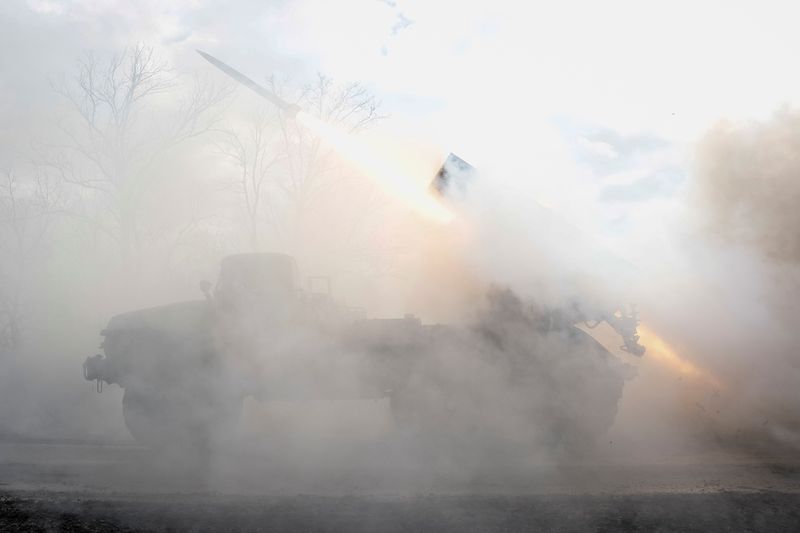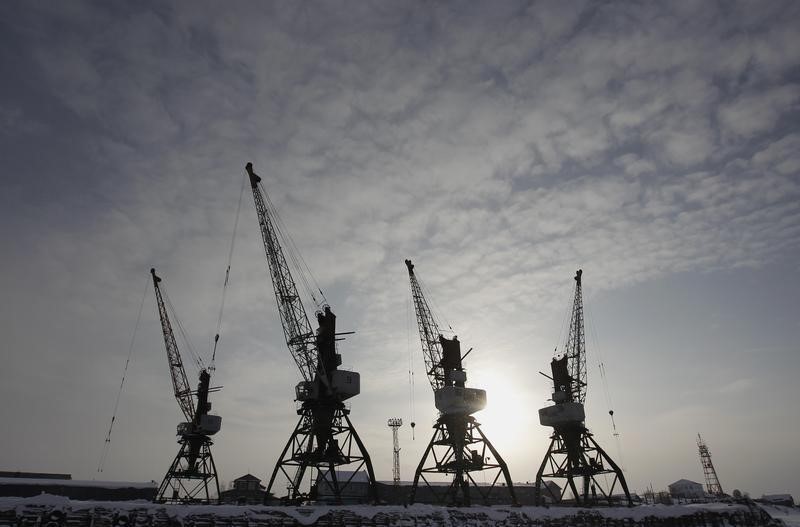By Philip Blenkinsop
BRUSSELS (Reuters) - Two years after Russia's invasion of Ukraine, there are clear signs that the global economy is fragmenting into two separate blocs and that multilateral trade rules that have underpinned commerce for nearly 30 years are under threat.
Rising geopolitical tensions, including in the Middle East, and concerns over economic security are leading to sanctions, trade curbs and signs of a widening split between countries supporting Russia and those backing Ukraine.
The World Trade Organization, which hosts its biennial ministerial conference to debate global trade rules next week, has warned that an outright fragmentation into two rival blocs would shrink the global economy by 5%, with developing countries suffering the most.
In this extreme scenario, the United States and China and their allies would be engaged in a bipolar trade war and the respective blocs would set their own rules, disregarding multilateral agreements.
We are not yet at that point, but WTO economists have shown that since Russia's invasion in February 2022, the two blocs are pulling apart.
"We find early evidence of a trend towards a stronger alignment between trade flows and geopolitical affinities since the onset of the war in Ukraine," they said in a report.
"Our findings point to the first signs of fragmentation in global trade."
They split the world based on different United Nations voting patterns, including but not limited to resolutions on the Ukraine war. They exclude Ukraine, Russia and Russian ally Belarus to remove the impact of sanctions and the war itself.
Their finding is that trade in goods between the blocs has grown 4% slower than trade within blocs.
While the economists showed signs of 'friend-shoring', they did not find evidence of extensive near-shoring, with no pick-up of trade within regions, although they did not assess whether countries are bringing parts of value chains back to their own territory. 'Friend-shoring' is a term used by U.S. Treasury Secretary Janet Yellen and others to encourage countries to diversify supply chains away from China to market-oriented democracies such as India.
US-CHINA TRADE
Looking at the United States and China alone, the WTO economists find that trade tensions, which jacked up when former U.S. President Donald Trump imposed tariffs on about two-thirds of Chinese goods imports, have been compounded by the Ukraine war.
Paradoxically, trade flows between the two spiked to a record high in 2022 as U.S. demand for Chinese consumer goods rose and Beijing's demand for U.S. farm products and energy grew. However, relative to each country's goods trade with other partners, their bilateral trade has slowed, WTO research shows.
It concludes that the initial increase in trade tensions and the subsequent war in Ukraine resulted in bilateral trade that was 31% slower from July 2018.
Geopolitical tensions are partly the cause of downbeat estimates for global goods trade growth, particularly for last year. The WTO has said it will cut its 0.8% estimate, while the World Bank puts the figure at 0.2%, the lowest growth rate of the past 50 years outside global recessions.
World Bank deputy chief economist Ayhan Kose told Reuters this weakness was occurring against a backdrop of dramatic changes to trade policy following a previous embrace of trade integration.
"That era basically disappeared. Now we have a new era characterised by countries not signing agreements... And then if you look at the number of trade restrictions introduced worldwide, that number has sky-rocketed."
Swiss-based monitoring service Global Trade Alert has found a massive build-up of distortive measures since the start of 2020, from Argentina's plan to raise an export tax on soy to India's increased import duty on palm oil and U.S. state aid for on-shoring of a semiconductor supply chain.
And while policies have at times eased earlier import and export curbs, the ramp-up of subsidies - typically making domestic goods look cheaper against imported ones - outweighed these.
The figure below shows the situation for critical raw materials, such as lithium and cobalt, to which countries are desperately seeking access to brace for a green transition and increasingly subsidising local industries to process.
A similar subsidies ramp-up is seen in other sectors Global Trade Alert monitors - food, medicines and global value chains. Not only are there more measures, but more countries are taking them, its data shows.
Trade restrictions and distortions reflect a push towards protectionism, undermining global rules that promote open trade and limit the extent to which countries can support domestic industry with subsidies and other measures.
The Institute of International Finance sees risks for global debt, with higher government spending to mitigate the adverse effects on supply chains of growing trade protection and geopolitical conflicts.
WTO Director-General Ngozi Okonjo-Iweala, who will chair the WTO's Feb. 26-29 meetings in Abu Dhabi, stresses the costs of fragmentation and advocates "re-globalisation", a revival of multilateralism that could boost the world economy by some 3%.

Georg Riekeles, associate director of the European Policy Centre think tank, said that for trade-reliant Europe in particular the best one could hope for was a shift to a new equilibrium that maintained open trade, at least with friendly partners.
"A retreat of globalisation due to more caution over China and over disruptions to value chains, such as the Red Sea, could be compensated by greater diversification and open trade elsewhere," he said.
